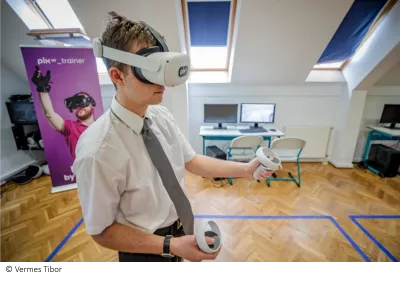General information
RDP Measure
- M20: Technical assistance
Summary
The virtual classroom is a new educational approach implemented by an agricultural vocational college in the small Hungarian town, Jánoshalma. The first project of its kind in Hungary, VR technology allows the college to provide its students with the highest level of practical training, regardless of location and without physical contact. In the long term, this educational approach will tackle the biggest difficulties of vocational training, which are the problems arising from a lack of access to modern agricultural machinery.
Results
The use of VR has allowed the students to experience various kinds of agricultural workflow, from the maintenance of the latest available agricultural machines to a first-hand view of how they are used in practice. That all without needing to have physical access to these machines.

Promoter
Pix VR Training
Funding
RDP contribution 732 555.25 (EUR)
Keywords
Context
Agriculture plays a vital role in the Hungarian economy. Therefore, agricultural education needs continuous development to ensure that students are taught using up-to-date methods to gain the right experience. Young people are interested in modern technologies, and technical devices like smartphones or tablets are part of their daily lives. Virtual Reality (VR) technology is new for most people and has enormous potential as a teaching tool. As with the use of any modern technology in the classroom, VR inspires curiosity and enthusiasm, which impacts upon student motivation and learning outcomes.
Objectives
This project used VR to improve the quality of agricultural vocational training in Hungary. The technology was used to create a virtual learning space for students where they could gain ‘hands-on’ experience of the latest agricultural machines and tools.
Activities
The idea for this pilot project was formulated at the beginning of May 2021 and was implemented by an agricultural vocational college in a small Hungarian town, Jánoshalma.
1st phase – Assessing the use of VR in education. A literature review was conducted to assess how VR technology can be adapted for use in education. This study was furthered through in-depth interviews, focus group discussions and questionnaires, the results of which informed the next phase of the project.
2nd phase – Adapting VR technology to education. During this phase, VR was tested by teachers and students to develop appropriate virtual models for teaching purposes. During this phase, the project team created a virtual classroom complete with the required interactive work tools, while participant teachers received practical training. The project also created a directory of information about virtual agricultural machinery and a repository of 3D spaces and machinery simulations.
3rd phase – Accreditation of the VR educational system. All tasks related to ISO certification were completed in this phase, including the plan for the system’s ongoing maintenance and use.
Key lessons
CAP funding can be used to help keep agricultural education in step with the rapid technological developments that affect the sector’s productivity. This cannot be achieved by using outdated textbooks or videos, or by using obsolete machinery and technologies.
Main results
This is the first project of its kind in Hungary. The use of VR has allowed the students to experience various kinds of agricultural workflow; from the maintenance of the latest available agricultural machines to a firsthand view of how they are used in production; all without needing to have physical access to these machines.
contact

